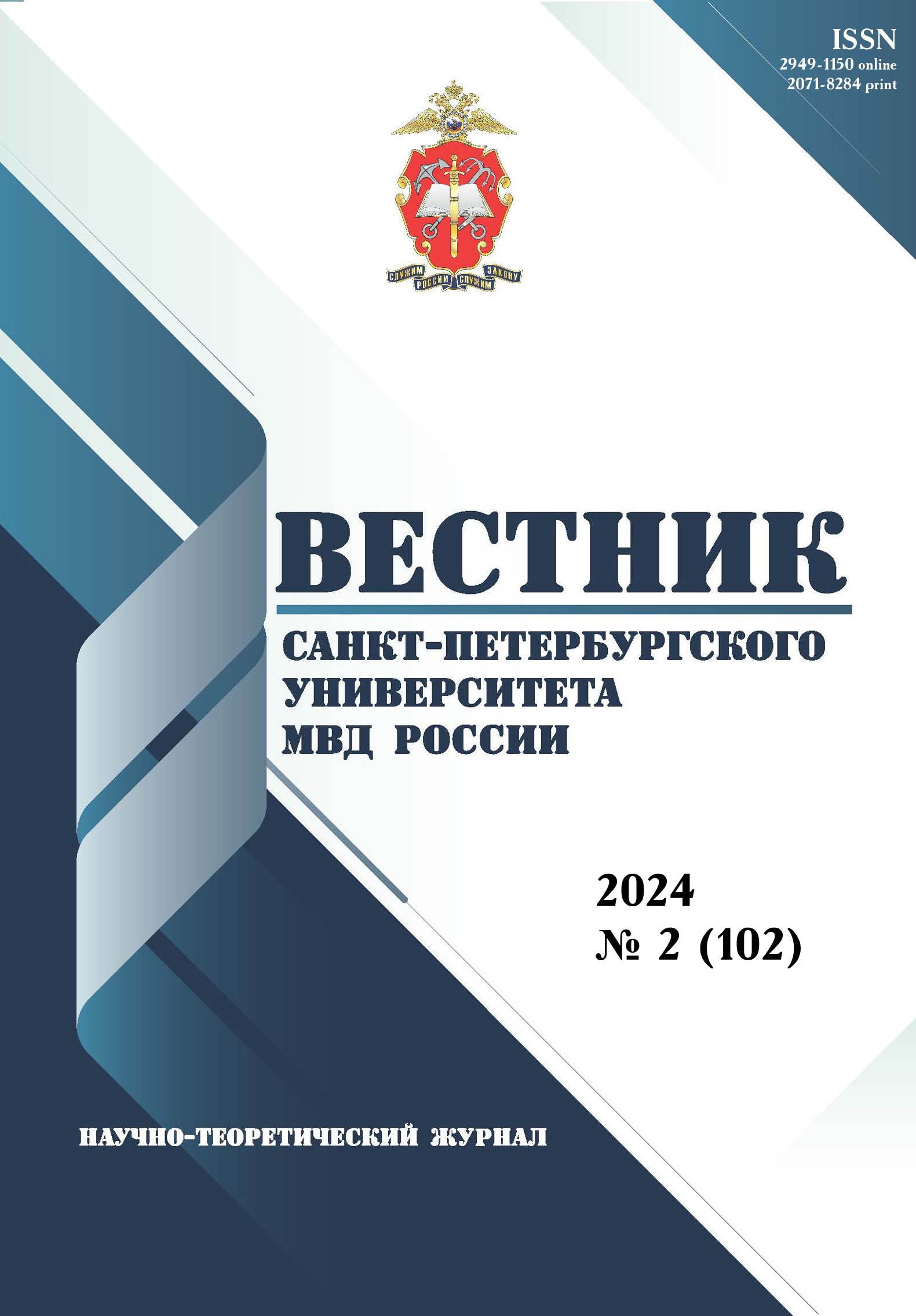employee from 01.01.2018 until now
Lyubercy, Moscow, Russian Federation
Russian Federation
UDC 378
Introduction. Online technologies are becoming increasingly accessible and popular among young people. However, this not only opens up new opportunities for communication and learning, but also creates the risk of involving minors in destructive Internet communities. Especially urgent issue today is the influence of destructive Internet communities, which promote their destructive activities in social networks and involve minors in them. With the spread of the Internet, minors in the virtual world are increasingly exposed to the influence of people involving them in destructive Internet communities. The article deals with the issue of training cadets – future juvenile inspectors to prevent the involvement of minors in destructive Internet communities. Research methods. The research involves theoretical analysis of pedagogical and educational literature, normative legal acts and Internet sources, general scientific methods of scientific cognition. Results. Considering the preventive activities related to preventing the involvement of minors in destructive Internet communities, it should be noted that this is a very difficult matter. However, during the training process the cadets will develop knowledge, skills and abilities of activities aimed at preventing the involvement of minors in destructive Internet communities, which will make it possible to facilitate the implementation of preventive work for future employees of the Department of Internal Affairs and, at the same time, to train really qualified specialists. In this regard, the author’s e-course “Preventive Activities of a Child Abuse Prevention Officer in Social Networks” and methodological recommendations for its use in the educational process for future juvenile inspectors were developed.
minor, destructive Internet communities, prevention, cadet, professional training, distance education technologies, e-course
1. Yerofeyeva M. A., Kharlamova D. A., Zhokov D. V. Destruktivnoye povedeniye nesovershennoletnikh kak prichinno-sledstvennaya svyaz’ ikh kriminalizatsii // Chelovecheskiy kapital. – 2023. – № 2 (170). – S. 233–240; https://doi.org/10.25629/HC.2023.02.27.
2. Serdyuk N. V., Grishchenko L. L., Stolyarenko A. M. Psikhologo-pedagogicheskiye aspekty profilaktiki ekstremizma v molodezhnoy srede // Psikhologiya i pravo : elektronnoye izdaniye. – 2018. – T. 8. – № 3. – S. 167–178; https://doi.org/10.17759/psylaw.2018080312. – URL: https://psyjournals.ru/journals/psylaw.
3. Gavrilina A. A., Kharlamova D. A. K voprosu podgotovki budushchikh inspektorov PDN k profilakticheskoy rabote v tsifrovom prostranstve / Zhuravlevskiye chteniya. Transformatsionnyye protsessy v pedagogicheskoy nauke i obrazovanii : materialy VI Mezhdunarodnoy nauchnoprakticheskoy konferentsii, posvyashchonnoy pamyati Vasiliya Ivanovicha Zhuravleva, 11–16 fevralya 2022 g. / otv. red.: N. A. Gorlova. – Moskva: Moskovskiy gosudarstvennyy oblastnoy universitet, 2022. – S. 111–118.
4. Ivanova S. V., Sadovnikova Zh. V. Vliyaniye destruktivnykh soobshchestv na shkol’nikov: postanovka problemy // Tsennosti i smysly. – 2022. – № 5 (81). – S. 83–92; https://doi.org/10.24412/2071–6427–2022–5–83–92.
5. Lukashkova I. Destruktivnyye internet-soobshchestva kak riskogennyy faktor sotsializatsii i razvitiya lichnosti nesovershennoletnikh // Thesaurus : sbornik nauchnykh statey. – Mogilev: Mogilevskiy institut Ministerstva vnutrennikh del Respubliki Belarus’, 2022. – Vyp. X: Kommunikatsiya v epokhu postpandemii. – S. 99–105.
6. Khametdinova G. F. Polnomochiya inspektora podrazdeleniya po delam nesovershennoletnikh v sfere obespecheniya bezopasnosti detey v informatsionnom prostranstve // Vestnik Sibirskogo yuridicheskogo instituta MVD Rossii. – 2020. – № 3 (40). – S. 65–70.
7. Yerofeyeva M. A. Pedagogicheskaya diagnostika : monografiya. – Saratov: Saratovskiy istochnik, 2022. – 177 s.
8. Nikitskaya Ye. A., Nikitina Ye. O. Sistema podgotovki sotrudnikov politsii k profilakticheskoy rabote s nesovershennoletnimi deviantnogo povedeniya // Psikhologiya i pedagogika sluzhebnoy deyatel’nosti. – 2019. – № 3. – S. 33–35.
9. Pavlov I. V., Pavlova I. I., Fogel’ Ye. V. Gotovnost’ sotrudnikov OVD k profilaktike pravonarusheniy nesovershennoletnikh // Psikhopedagogika v pravookhranitel’nykh organakh. – 2006. – № 2 (26). – S. 107–112.
10. Ul’yanova I. V., Yerofeyeva M. A., Anan’in O. Yu. Innovatsionnyye podkhody v podgotovke kursantov – budushchikh inspektorov po delam nesovershennoletnikh k profilaktike destruktivnykh form povedeniya podrastayushchego pokoleniya // Prikladnaya psikhologiya i pedagogika : setevoye izdaniye. – 2022. – T. 7. – № 3. – S. 44–53; https://doi.org/10.12737/2500-0543-2022-7-3-44-53. – URL: https://naukaru.ru/en/nauka/journal/77/view.
11. Kharlamova D. A. K voprosu o neobkhodimosti profilakticheskoy raboty inspektora po delam nesovershennoletnikh v aspekte mediabezopasnosti nesovershennoletnikh // Prikladnaya psikhologiya i pedagogika : setevoye izdaniye. – 2023. – T. 8. – № 1. – S. 188–193; https://doi.org/10.12737/2500-0543-2023-8-1-188-193. – URL: https://naukaru.ru/ru/nauka/issue/3571/view.
12. Vayndorf-Sysoyeva M. Ye., Subocheva M. L. Tsifrovoye obucheniye v kontekste sovremennogo obrazovaniya: praktika primeneniya : monografiya. – Moskva: Diona, 2020. – 244 s.
13. Avadayeva I. V., Anisimova-Tkalich S. K., Vezetiu Ye. V. [i dr.]. Metodologicheskiye osnovy formirovaniya sovremennoy tsifrovoy obrazovatel’noy sredy : monografiya. – Nizhniy Novgorod: Professional’naya nauka, 2018. – 174 s.
14. Akhmetzhanova G. V., Yur’yev A. V. Tsifrovyye tekhnologii v obrazovanii // Baltiyskiy gumanitarnyy zhurnal. – 2018. – T. 7. – № 3 (24). – S. 334–336.
15. Soldatova G. U., Rasskazova Ye. I., Vishneva A. Ye., Teslavskaya O. I., Chigar’kova S. V. Rozhdennyye tsifrovymi: semeynyy kontekst i kognitivnoye razvitiye : monografiya. – Moskva: Akropol’, 2022. – 356 s.















